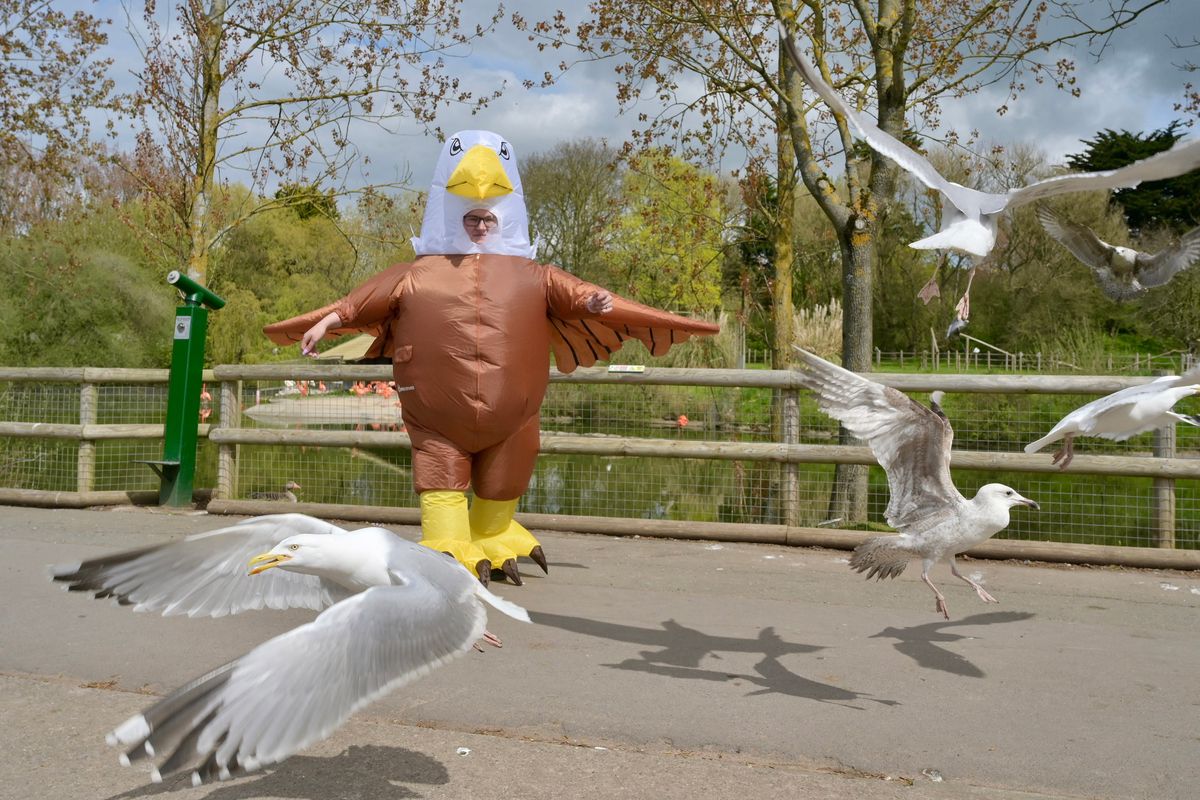Zoo seeks ‘outgoing’ worker to wear big bird costume and scare seagulls

If you’re friendly, energetic and up for a challenge, a zoo in a popular British seaside town may have the perfect role for you: chasing away seagulls while wearing a giant bird suit.
The successful candidates will be paid up to £10.80 per hour (around $13.50) to wear an eagle costume and act as a “seagull deterrent” to prevent the birds from harassing guests and animals alike at Blackpool Zoo in northwest England.
Those applying should be “visitor focused,” “friendly,” and also “outgoing – as you need to be comfortable wearing a bird costume!” the advertisement says.
“Lively, energetic, fun and, most importantly, an excellent flapper, will be top of the essentials list during interviews,” the zoo added in a statement, particularly as successful candidates are likely to be “approached for pictures by a lot of people.”
Khaled Fawzy, the zoo’s section head for birds and events, said in an interview that the global attention in the job ad had “taken us all by surprise.” More than 200 people have applied for the five available roles, including from countries as far afield as Thailand, India, Ukraine and Uganda. Fawzy said some had even sent videos of themselves wearing fruit and vegetable costumes as part of their applications.
There is a serious reason for hiring the seagull deterrent, as seagulls are one of the biggest sources of visitor complaints at the zoo, and their sharp beaks can cause minor injuries to children as they steal sandwiches and ice creams, Fawzy said.
The zoo’s winged inhabitants also have come under attack, Fawzy added, as the seagulls have raided the nests of the native species of birds and ducks that nest on the zoo grounds, and disrupted feeding time for penguins and pelicans. “They’re a nightmare,” he said.
The seagulls appear to have become emboldened in recent years, as crowds return after the pandemic and more Britons have taken advantage of domestic holidays and day trips rather than going abroad, Fawzy said.
The zoo describes the seagulls as “intelligent” creatures that have evaded most previous attempts to deter them.
Eagle-shaped kites and statues of owls and eagles have failed. The zoo even enlisted a real-life bird of prey, a hawk, to fly around the zoo, Fawzy said – but the seagulls, unfazed, “gathered together in flocks of 20 or 30 and … dive-bombed the hawk.”
This new idea, by contrast, has been so successful at keeping the seagulls at bay that the zoo had to put food out to lure the seagulls back to allow media crews to film the costume in action, Fawzy said.
“The costume is something the seagulls won’t have seen before, and as intelligent birds, they will naturally not like it. The costume also makes a sound when the person is moving, which is something else the seagulls don’t like,” the zoo said in its statement.
The zoo’s peak season is from spring to autumn, and the new employees will work seasonally. They also will have a role in educating the public about not feeding the birds, as well as avoiding littering and pollution, and may at some point be required to wear other costumes so the birds do not become too accustomed to the new approach.
Although the zoo wants to deter the seagulls, Fawzy stresses that the birds are wild and that their behavior is not unusual: “They’re actually just adapting to their environment, like any other species would.”